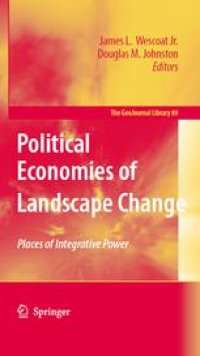
Ebook: Political Economies of Landscape Change: Places of Integrative Power
- Tags: Human Geography, Landscape/Regional and Urban Planning, Landscape Architecture, Urbanism, Environmental Management
- Series: The GeoJournal Library 89
- Year: 2008
- Publisher: Springer Netherlands
- Edition: 1
- Language: English
- pdf
"Places of Power" contributes to the Landscape Architecture Foundation’s Landscape Futures Initiative, which explores driving forces of landscape change that societies and designers will face in the 21st century.
Politics and economics exert profoundly important, and dynamic, influences on land use, landcover, and landscape experience. Likewise, landscapes shape political economies from the site to global scales.
This book examines the complex relationships between political economy and landscape change. It encompasses perspectives ranging from radical landscape interpretation to sustainable livelihoods, real estate economics, institutions, international landscape policies, and global finance. It asks what difference "design", can make within the broader structural contexts of landscape change.
The perspectives in this book share a common concern for what economist and futurist Kenneth Boulding termed "integrative power" – the power of human solidarity, respect, and love – to direct political and economic change toward paths of sustainable landscape design. They speak to landscape architects, planners, urbanists, geographers, and social scientists about some of the most pressing issues of our times.
"Places of Power" contributes to the Landscape Architecture Foundation’s Landscape Futures Initiative, which explores driving forces of landscape change that societies and designers will face in the 21st century.
Politics and economics exert profoundly important, and dynamic, influences on land use, landcover, and landscape experience. Likewise, landscapes shape political economies from the site to global scales.
This book examines the complex relationships between political economy and landscape change. It encompasses perspectives ranging from radical landscape interpretation to sustainable livelihoods, real estate economics, institutions, international landscape policies, and global finance. It asks what difference "design", can make within the broader structural contexts of landscape change.
The perspectives in this book share a common concern for what economist and futurist Kenneth Boulding termed "integrative power" – the power of human solidarity, respect, and love – to direct political and economic change toward paths of sustainable landscape design. They speak to landscape architects, planners, urbanists, geographers, and social scientists about some of the most pressing issues of our times.